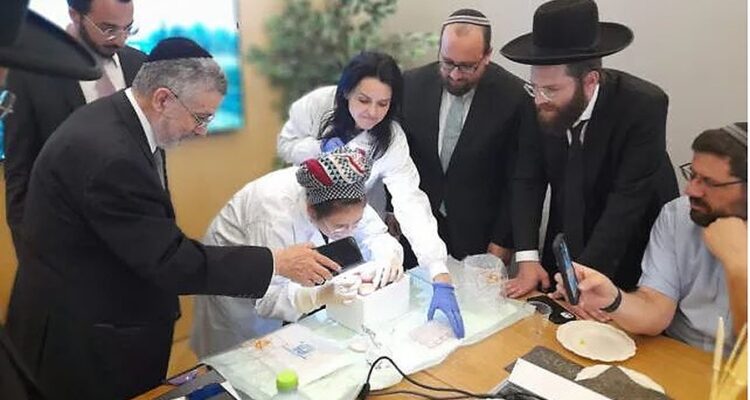Whether cultured-cell meat can be considered pareve and eaten with milk is a separate, and controversial, issue.
By Batya Jerenberg, World Israel News
The largest kashruth certification agency in the world has declared as kosher lab-grown chicken meat made by an Israeli company, paving the way for religious vegetarians to enjoy the taste of poultry without violating their principles.
The ruling by Orthodox Union (OU) Kosher came after months of consultations with start-up SuperMeat that went step-by-step through their process.
“This collaboration aims to bridge the gap between scientific understanding and halachic adjudication, setting unprecedented standards in the cultivated meat industry,” said the agency’s CEO, Rabbi Menachem Genack.
The alternative meat product was granted the highest certification, that of being mehadrin kosher.
SuperMeat CEO Ido Savir proudly announced the breakthrough on Wednesday.
“Aligning our technology with kosher dietary laws holds immense significance for us,” he said in a statement. “This step represents our commitment to inclusivity and respect for diverse dietary needs, making our cultivated chicken meat accessible to audiences around the world.”
The company would also be seeking halal certification so that religious Muslims could eat it, too, he said.
While kosher, according to the OU the meat-substitute is not pareve, meaning that it cannot be eaten with milk products according to Jewish dietary restriction. This is because the process begins by taking stem cells from a fertilized chicken egg, meaning that its source is still an animal. It therefore is irrelevant that the cells grow into meat tissue by putting them into a special machine with a plant-based nutrient and adding heat and oxygen.
Another reason for maintaining that it is meat is that it looks exactly like the real thing. Any food that can confuse consumers into making kashruth mistakes is looked upon very cautiously by certification agencies.
The rules have yet to be universally set, though, as in January, Israeli Ashkenazic Chief Rabbi David Lau ruled that another Israeli company’s alternative meat product was pareve. He based his decision on the fact that despite the initial cells being taken from fertilized cattle embryo, Aleph Farms Cultured Steak did not come from a slaughtered animal and contains no blood, which is another taboo for religious Jews.
His caveat was that the product would have to be clearly marketed as a meat alternative, and could not be made to look or smell exactly like meat.
The cultured meat industry is still taking its first baby steps, but Israel is one of the countries that is leading the way. It is unknown whether its products will be either popular or affordable enough to take off as a valuable addition to the global food supply. Another one of its claims, besides stopping animal suffering, that it is more environmentally friendly than raising cows and chickens, also has yet to be proven since mass production has yet to begin.





